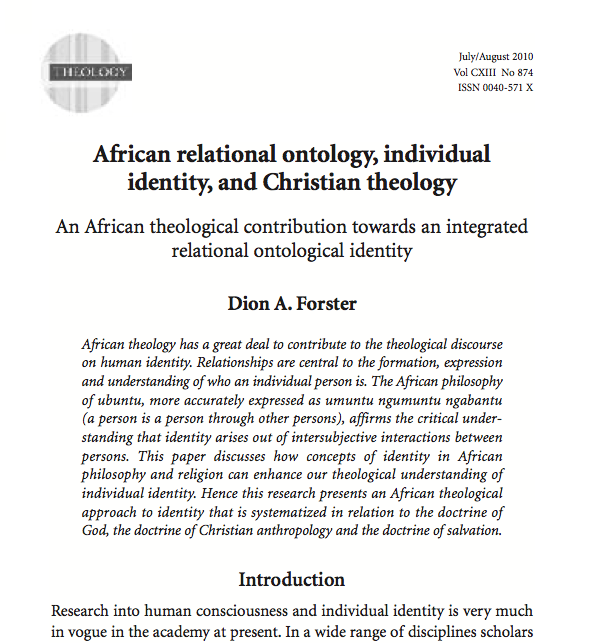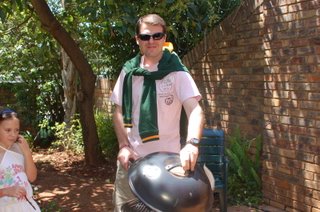 Culture is a necessary thing - it structures our lives in relationship, it adds meaning and depth to communal practices, it enlivens our history, and shapes our future.
Culture is a necessary thing - it structures our lives in relationship, it adds meaning and depth to communal practices, it enlivens our history, and shapes our future.
You would know that I ardently encourage the adoption of the ideology of ubuntu as a principle for relationship based justice, harmony, and equity. I do so primarily because there is so much of this ideology that can positively shape society (particularly societies that have become competitive, self obsessed, and disregarding of the rights and responsibilities that we have for one another's wellbeing). In fact, I find many more Gospel values in the principles of ubuntu than I do in Western Capitalist individualism...
However, there is a HUGE disconnect between the ideology of ubuntu and its ethical application in contemporary Southern Africa. Whilst the ideology is touted by many, there are very few who hold it dear enough to actually practice it!
I wrote a paper on this subject that you download and read here.
Sadly, my experience has been that even in traditional African communities, as soon as the individual can afford a BMW, buy a house in the subburbs, and outwit, outlast and outplay other persons, the ideology and philosophy of interdependent identity and harmony in relationship is chucked out of the windows in the pursuit of individual gain!
Sadly, culture is abused by many as a tool to justify abusive practises, and at the same time avoid responsibility. This disturbing article comes from the Mail & Guardian newspaper.
While the United Nations Millennium Development Goals aim to empower women and eradicate poverty, Southern African inheritance practices are having the opposite effect -- leaving widows impoverished, maligned and separated from their own children, says a recent study out of Mozambique.The study by Save the Children highlights how tradition -- which dictates that the man's family can devolve the deceased's assets among themselves -- leads to widows being made scapegoats for their husbands’ deaths and losing custody of their children.
Maria Delia and Isauru Mandlate, part of the team that conducted the study for the Save the Children Foundation in Mozambique, say that in addition to dealing with bereavement, a widow faces the immediate loss of her home and all her possessions.
Women are commonly accused of bewitching their husbands and causing their deaths, and this is used as a pretext for refusing them their inheritance.
“The family is not interested in negotiating, they just want the goods, "says Delia. “This is revenge for her having 'killed' her husband. They are really rough and don’t leave her with a single penny."
But even more painful than the loss of material possessions, say the researchers, is the way the husband’s family will poison the children’s minds, leading them to believe their mother is responsible for their father's death.
"The children are not allowed to visit their mother -- the children are told to run away from their mother if she comes to visit," says Delia.
Widows who refuse to participate in the ritual of "purification" -- which requires them to have unprotected sexual intercourse with a male member of their husband’s family to dispel bad spirits -- are banished from the family and even the district.
The result is that dispossessed widows turn to sex work or cheap manual labour to survive and are more vulnerable to risky sexual activity and HIV infection.
Delia tells the story of a young widow whose husband died of Aids. "Her husband had gone to South Africa to work on the mines and while he was away she lived with her in-laws. When he became ill he came home and she cared for him. When he died, they [the in-laws] kicked her out."
The woman ended up living in a mud hut, without even a bed to sleep on and just the clothes on her back. She survives on the few stalks of maize and vegetables she can grow.
The study says patrilineal African societies view male heirs as continuing the family line, while women are seen as assuming only the role of temporary guardians of assets. As a result the deceased's family members feel they are entitled to all his material possessions -- even if the widow has worked to contribute to the shared assets.
The report notes that despite Mozambique being a signatory to instruments such as the UN Convention on the Rights of the Child, the UN Convention on the Elimination of all forms of Discrimination Against Women and the African Charter on the Rights and Welfare of the Child, the government has yet to produce comprehensive legislation on inheritance.
In South Africa this tradition has been challenged by progressive human rights legislation, where a precedent was set by the Constitutional Court in 2004.
Nontupheko Bhe, a widowed Khayelitsha woman, approached the court to have the Black Administration Act -- which provided that if Africans died intestate their estate would be devolved according to customary law -- declared unconstitutional.
The court ruled that the Act was an "anachronistic piece of legislation which ossified 'official' customary law and caused egregious violations of the right of black African persons” and found that "whatever the role of male primogeniture may have played in traditional society, it can no longer be justified".
Despite this landmark ruling, the law is often at odds with deep-seated cultural norms and many women remain unaware of their rights.
"In many instances the widow is made aware of her rights too late and the assets have been claimed by the in-laws or the livestock is already sold," says Busi Motshana, a paralegal at Tshwaranang Legal Advocacy Centre in Acornhoek, Limpopo.
In addition to ignorance of their rights, there is also a culture of silence among women and children -- who are generally passive participants in traditional society. In rural areas access to facilities and institutions of justice is an added obstacle. The drawing up of a formal will is rare, in part due to issues of access, but also due to the fear that doing so is tantamount to inviting an early death.
"This is becoming an issue as more people die of HIV/Aids," says Delia.
"More needs to be done in the communities to educate and inform these women on their rights and also encourage community reform."
Technorati tags: ubuntu, human rights, responsibility, African, culture, widow
 Monday, June 4, 2012 at 9:10PM
Monday, June 4, 2012 at 9:10PM 






